Looked at objectively, a bilateral trade agreement between Britain and the United States is of relatively small economic significance to this country. Back in 2020, Boris Johnson’s government estimated that a US deal “could increase UK GDP in the long run by around 0.07%” – a figure that is not exactly transformative. The view touted by some Brexiters that a US trade deal would fire up the entire British economy was always a fantasy, the product of deregulatory yearning for which there was little public support, even among leave voters. Any urge of that kind is clearly even more delusional now, in the wake of Donald Trump’s tariff wars.
Hopefully, the right’s across-the-board deregulatory horror is now a thing of the past. But global trade has new traumas too. Mr Trump’s protectionism and bullying of US rivals are resetting the terms. There are nevertheless specific reasons why it is in Britain’s interest to pursue freer trade talks with the US. Chief among these is the threat posed by current tariffs, especially on cars and pharmaceuticals, as well as the prospect that a 10% tariff will be reimposed on all UK exports to the US after the current pause ends in July.
The problem with any deal lies with the prices that the US may try to extract for tariff reductions or exemptions. Although the vice-president, JD Vance, said this week that he sees a “good chance” of a deal, this could still be contingent on UK concessions in sectors such as agriculture, sanitary and phytosanitary rules and digital regulation. These are essentially the same sectors that, for good reason, proved to be stumbling blocks in the post-Brexit discussions. Efforts to rebrand things like AI, biotech and digital as strategically important industries of the future do not dispel some real threats now facing British food standards, healthcare or online controls.
All this is multiplied by the Trump administration’s unreliability and geostrategic approach. The administration’s goal in Europe is to weaken and destroy the EU. Urged on by rightwing Brexiter politicians, the president sees pulling Britain away from the EU’s orbit as part of that effort. So, however, does the EU. As a result, any attempt by Washington to offer generous terms to the UK in particular sectors is likely to make any reset with the EU more difficult. Sir Keir Starmer says that Britain does not need to make an either/or choice. Like Mr Johnson, he says Britain can have its cake and eat it. The brutal reality is that neither the US nor the EU will necessarily take the same generous view.
Even if the prospective UK-US deal is less wide-ranging than it might once have been, it is still significant. Politically, the Trump factor also makes any such deal more explosive. UK treaties and trade deals are traditionally made under prerogative powers. As the Brexit argument about a “meaningful vote” showed, there is a very limited role for parliament. That needs to change. It would be intolerable in the UK-US case. This is clearly a matter for parliament to debate, both during and after negotiations, and for both houses of parliament to vote on.
This week, the Labour chairs of the Commons foreign affairs and trade select committees called for such votes. The Liberal Democrats and the Scottish National party are both in favour. The government should make clear that no agreement will go ahead without a meaningful Commons vote in favour.
